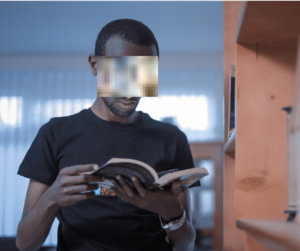Abdullah’s call out of Africa; into America
AfriGO Team

Persecution and economic necessity led Abdullah to flee his home country, but the call of God followed him.
When he arrived in New York airport, Abdullah insisted to the immigration official that he was a pastor. But his Muslim name and country of origin indicated the opposite. For two hours, he was interrogated, including questions about the Bible to determine if he really was a Christian. Finally, Abdullah begged to be let go, “I have just come off a long flight and I am exhausted!” And so, he arrived in the United States.
Abdullah grew up in East Africa in a Muslim family but gave his life to Christ four months after seeing a vision of Jesus. Wanting his neighbours to know Jesus, he took a course on how to reach Muslims. As he preached, however, he was thrown out of the area and even had to leave his own country.
In the new place, he kept preaching, so his extended family decided to make him stop. They persecuted those close to him, and one was even kidnapped. Eventually, Abdullah made the difficult decision to immigrate to the USA to protect his wife and children and to find a way to provide for them.
These hardships made him want to live just a “normal life,” but he grew deeply unhappy working at a job just to make money. Back in Africa, his wife encouraged him to return to his ministry calling. However, he knew that every time he preached, his circumstances grew harder. “I knew something was coming,” he says, as he considered returning to God’s work. But he also knew he didn’t have a chance at joy without preaching. Without ministry, “you lose the purpose of life,” he said.
 Eventually, a friend took him to an inner-city area where the African-American community was marginalized and poor. Crime and even murder rates were high, and Africans warned him that his life would be at risk. He prayed, and God clearly told him to join the church, where he is a pastor today.
Eventually, a friend took him to an inner-city area where the African-American community was marginalized and poor. Crime and even murder rates were high, and Africans warned him that his life would be at risk. He prayed, and God clearly told him to join the church, where he is a pastor today.
The church is not large, but it is deeply involved in the local community, where the youth are at risk from drugs and crime. Many drop out of school, feeling hopeless about their futures. African-American youth are often intrigued by the continent of Africa and they find Abdullah’s life experiences interesting. This, and his care for them, draws some closer. Abdullah’s vision is to raise up Christians from the congregation to carry the message and continue the church’s ministry to those mired in addictions and in a poverty mentality.
Culture: The biggest hurdle
Abdullah finds the differences between his culture and that of the African-American community a real paradigm shift, and the learning curve has been steep. Before he arrived, he had worked with whites for many years and felt he had some understanding about their culture. But this new community was different.
As he began to teach on marriage, he was disturbed to meet many unmarried couples who had several children together. However, being judgmental or “correct” was not helpful; rather, listening and loving began to bring transformation towards a more biblical outlook.
Abdullah says, “Africans, we want everyone to accept us, but we don’t want to accept others. That’s the biggest problem. We go everywhere and we want to build our own kingdom. We love to do our own thing. The most difficult thing at first was wanting them to accept me, but I never saw how I could accept them, too. It was a culture barrier. Even if I have knowledge about culture, it was difficult to adapt.”
Adaptation is the key
“I saw the pain more than the culture,” he says. He had never experienced slavery, and couldn’t understand the deep pain of that, so he had to listen to understand that history. He adds, “The thing I saw in African-Americans was a brokenness and a desire for love.”
Aspects of Abdullah’s culture are similar to the African-Americans he knows, such as speaking what is on your mind. But this didn’t turn out to be edifying to both parties. Instead, he purposed to change the way he communicated.
“It is ironic because in Africa, when short-term American missionaries came to his country, they were afraid of being killed.”
“God gave me a chance to listen, and His love became our common language.” In listening, he could learn from them, too.
Abdullah advises, “It’s hard if you come with the mindset of dealing with culture, but if you come with the true gospel, it is easier to understand anyone. You can have good communication if Christ becomes the centre of your relationship.”
“The first six months were really hard. Some in the community didn’t like me and some wondered, who is this African guy and what does he wanted to do? But finally they understood, because Christ became the centre.”
Advice for Africans in the West
Abdullah believes that Africans coming to the West struggle with having confidence in themselves, and this hinders adapting. He says, “They have to believe they have something to share and have confidence, because it is all about Jesus, not about being African or American.” In the beginning, he felt humiliated when people made fun of his accent, but eventually he came to not care much about that.
 He has seen that many Africans in the USA have not tried to experience life as Americans do, and that’s why they end up starting African churches, though they may have intended to reach Westerners. They stay in communities that are familiar and which automatically accept their food, clothes, and way of doing things.
He has seen that many Africans in the USA have not tried to experience life as Americans do, and that’s why they end up starting African churches, though they may have intended to reach Westerners. They stay in communities that are familiar and which automatically accept their food, clothes, and way of doing things.
He cautions, “You can’t learn culture in a computer. You have to join them, take tea, preach the gospel. Africans love to sit and learn, but they are not good at taking a risk.” Taking that risk is essential to learning Western culture and reaching those functioning in that culture.
It was hard for Abdullah to go to work in the inner-city African-American community at first because other Africans told him, “You’ll be killed. You’ll be dead.” It is ironic because in Africa, when short-term American missionaries came to his country, they were afraid of being killed. But once they got to know locals, they changed their minds. He believes that Africans will also change their minds when they get to know and are known by people.
Experiencing racism in the West
When asked about racism in the USA, Abdullah laughed, saying, “Wars are raging on my continent because of racism. Racism in the West sometimes can be more subtle and that makes it hard to deal with.” When Abdullah visited white churches, he had a difficult time because of his Muslim name. “I could see their faces change,” he says. One lady even ran away from him. Even more painful is when people say nothing, but the attitude behind the face shows racism.
“I have to make sure to show Jesus, not my attitude,” Abdullah commented. He used to struggle with anger over this, but Jesus healed him. Instead, he is sad to see such things in the house of the Lord. Now he doesn’t respond the same way to such attitudes and advises that one cannot change racist attitudes in others; instead, you must change yourself. Say, “I love you brother, no matter what.” He has found that his patience works changes. Over time, people begin to love him and see him for himself, rather than their assumptions about his origin or race.
He encourages Africans to remember that millions of people face racism and prejudice; they are not the only individuals to experience it. Without the grace of God, anyone given the right circumstances may become prejudice and racist.
Abdullah wants to remind Africans working in the West that if God has called them and they have chosen to obey, then they cannot complain. He says, “If you want it to be like home, go back.” It is the gospel that is important and that becomes the centre; it is the point of communication and satisfaction in the midst of cultural differences, hardship and racism.
“It’s a new environment, a new country, a new culture. What are you waiting for it to be like… Ghana? Adjust your mind before you come. Something new is awaiting you!”
 Expand Your Vision in 2026
Expand Your Vision in 2026